

Educational Technology and Mobile Learning: google docs. Google Drive. Edutopia. It's hard to imagine a single career that doesn't have a need for someone who can code.
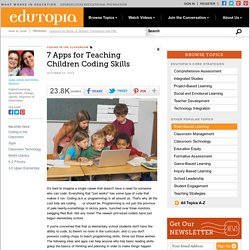
Everything that "just works" has some type of code that makes it run. Coding (a.k.a. programming) is all around us. 100 Reasons to Mind Map. 100 examples of how you can use mindmapping whether completely new to mind maps or a seasoned pro.
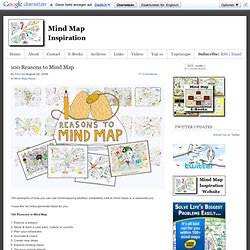
I hope the list helps generate ideas for you. 100 Reasons to Mind Map. Is Google Making us Stupid? Response to Nicholas Carr Article Is Google Making Us Stupid. Viewpoint Response to Nicholas Carr's 'Is Google Making Us Stupid?
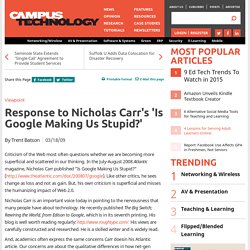
' By Trent Batson03/18/09 Criticism of the Web most often questions whether we are becoming more superficial and scattered in our thinking. In the July-August 2008 Atlantic magazine, Nicholas Carr published "Is Google Making Us Stupid? " Techs That Make Us Stupid. Increasing dependence on GPS devices might affect development in our brains.
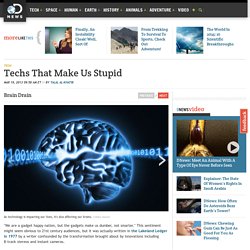
Three studies out of McGill University in 2010 suggested that how a person navigates can have implications for brain function as that person ages. To find our way around, humans use one of two strategies, as reported by NBC News: spatial navigation memory, in which we use maps developed in our brains using visual cues, and stimulus response, which is essentially just following directions that are either memorized or presented as needed. The hippocampus is the part of the brain that deals with memory and spatial orientation, and is among the parts of the brain initially impacted by Alzheimer's disease. The hippocampus shrinks as we age. Those who actively use their spatial memory will have higher volumes of gray matter in their brains. Although the study does not show causality, exercising your hippocampus, as the authors suggest, by occasionally turning off the GPS is a smart move to make. How Modern Technology is Making us Lazy and Stupid! - PCTECHAUTHORITY.
In a modern world driven solely by technology it appears that almost every aspect of our daily lives now rely on some form of technological means.
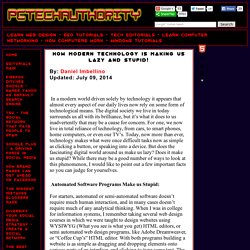
The digital society we live in today surrounds us all with its brilliance, but it’s what it does to us inadvertently that may be a cause for concern. For one, we now live in total reliance of technology, from cars, to smart phones, home computers, or even our TV’s. Automation Makes Us Dumb. Artificial intelligence has arrived.
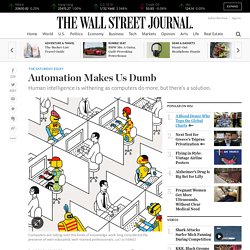
Today’s computers are discerning and sharp. They can sense the environment, untangle knotty problems, make subtle judgments and learn from experience. They don’t think the way we think—they’re still as mindless as toothpicks—but they can replicate many of our most prized intellectual talents. Dazzled by our brilliant new machines, we’ve been rushing to hand them all sorts of sophisticated jobs that we used to do ourselves. But our growing reliance on computer automation may be exacting a high price. It has been a slow process. Then, in the 1950s, a Harvard Business School professor named James Bright went into the field to study automation’s actual effects on a variety of industries, from heavy manufacturing to oil refining to bread baking.
Google Is Making Us Stupid and Smart at the Same Time? People have been saying that computers are making us dumber basically since computers existed.

Then the Internet came, eventually bringing Google into existence, and any hope for the future of intelligent life spiraled off into cyberspace. A seminal 2008 cover story by Nicholas Carr in The Atlantic put the question on the stand: "Is Google Making Us Stupid? " The article served more as a jumping off point for future research and over the course of the next few years, scientists and journalists alike tried to provide an answer with a number of experiments and studies.
(Carr kept going too, expanding the six-page piece into a 276-page book, The Shallows: What the Internet Is Doing to Our Brains.) A just-published study in Science offers the latest set of findings, and a quick read suggests that yes, Google is hampering our ability to recall information. Search engines are rerouting our memory. Certain types of memory are improving. Multitasking makes memory worse.
The Ultimate Guide To Emerging Technologies. 5 Reasons We Use Social Media 8.42K Views 0 Likes There are many reasons we use social media. From the basic to the more advanced, the tool is simply ubiqutious and addictive. A Periodic Table of Visualization Methods. The Inside-Out School: A 21st Century Learning Model. The Inside-Out School: A 21st Century Learning Model by Terry Heick As a follow-up to our 9 Characteristics of 21st Century Learning we developed in 2009, we have developed an updated framework, The Inside-Out Learning Model.
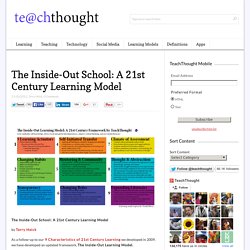
The goal of the model is simple enough–not pure academic proficiency, but instead authentic self-knowledge, diverse local and global interdependence, adaptive critical thinking, and adaptive media literacy. By design this model emphasizes the role of play, diverse digital and physical media, and a designed interdependence between communities and schools. The attempted personalization of learning occurs through new actuators and new notions of local and global citizenship. Here, families, business leaders, humanities-based organizations, neighbors, mentors, higher-education institutions, all converging to witness, revere, respond to, and support the learning of its own community members.
The 9 Domains Of the Inside-Out Learning Model 1. 2. 3. 4. 9 Characteristics Of 21st Century Learning. The label of “21st Century learning” is vague, and is an idea that we here at TeachThought like to take a swing at as often as possible, including: –weighing the magic of technology with its incredible cost and complexity –underscoring the potential for well thought-out instructional design.
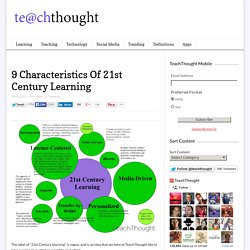
AR week 3. I-try-microsofts-crazy-hololens-108777779824. Thank you, Microsoft.

Thank you for throwing a crazy augmented reality announcement into a standard operating system event. Thanks for thumbing your nose at Google (which just gave up on the first version of Google Glass), and showing us Microsoft HoloLens. It is surely the most unexpected announcement to come out of Microsoft in years — maybe ever. (Photo: Microsoft) HoloLens is the hardware side of Microsoft’s other big Windows A.R. announcement: Windows Holographic. 3d-printed-model-heart-helps-doctors-save-a-little-108202597809. We’ve seen several accounts of 3D-printing being used to save the lives of patients, and out of Florida comes another such wonderful story. Cardiovascular surgeons at Miami Children’s Hospital turned to 3D printing to print out a scale replica of a 4-year-old girl’s heart so they could plan for a complicated surgery to save the girl’s life.
She suffers from a congenital condition called total anomalous pulmonary venous connection (TAPVC), which basically means her veins pump blood to the wrong part of her heart, causing breathing difficulties, lethargy, and a weakened immune system. After a few Band-Aid surgeries that proved to be temporary fixes, doctors knew they needed to come up with a solution. The situation was dire, as the cardiac team estimated that she would live for only another few weeks, if not days, without a permanent fix.
NEVER Do This Exercise (accelerates aging) A peek inside the 2015 International Consumer Electronics Show.